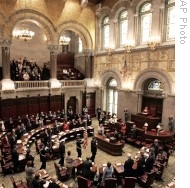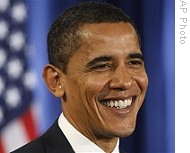-
(单词翻译:双击或拖选)
 |
| Members of New York state's electoral college at the Capitol in Albany, N.Y., 15 Dec 2008 |
It is a tradition that goes back to the beginning of the U.S. republic and the first presidential election in 1789.
Several weeks after the presidential election popular vote, presidential electors meet in the various state capitals and officially cast their ballots1, as required by the U.S. Constitution.
Mr. Obama won the election over Republican John McCain on November 4. Mr. Obama won 365 electoral votes, while Senator McCain won 173.
In all but two states, the winner of the popular vote is awarded all of that state's electoral votes.
The exceptions are Maine and Nebraska, which award electoral votes both statewide and by congressional district.
The electoral vote count in the various state capitals is largely ceremonial in nature and there is little suspense2 about the outcome.
In Pennsylvania, clerk Clifford Levine announced the results after the presidential electors cast their votes in the state capital of Harrisburg.
"The electors of the Commonwealth3 of Pennsylvania have cast 21 votes for the honorable Barack Obama as President of the United States," said Levine.
Pennsylvania Governor Ed Rendell said it was a day the electors would always remember as they voted to confirm the first African-American president.
 |
| President-elect Barack Obama smiles during a news conference in Chicago, 11 Dec. 2008 |
But Rendell also said Mr. Obama will face daunting4 problems when he takes the oath of office in Washington on January 20.
"You will be voting for a president who will undertake probably the most serious array of challenges that any president since Franklin D. Roosevelt has undertaken," said Rendell. "This country is suffering financially in ways that many people find hard to believe."
There was a note of elation5 in Mr. Obama's home state of Illinois, where several electors recalled serving with the next president when he was a member of the Illinois state senate.
Illinois Secretary of State Jesse White addressed the state electors.
"We are here today to celebrate a great victory. This is not a victory for one group over another or one party over another or one point of view over another. Today, we celebrate a victory for America," said White.
The results from the Electoral College voting will be reported to the new Congress in early January prior to Mr. Obama taking the oath of office on January 20.
It has been announced that Mr. Obama and Vice6 President-elect Joe Biden will travel to Washington by train in the days leading up to the inauguration7.
Inauguration organizers say Mr. Obama will make stops in Philadelphia, then go to Wilmington, Delaware where he will be joined by Vice President-elect Biden. The two will then stop in Baltimore, Maryland on January 17 before they arrive in Washington.
After his swearing-in on January 20 on the steps of the U.S. Capitol building, Mr. Obama will deliver the inaugural8 address, take part in an inaugural parade through Washington and will attend several inaugural balls that evening.
 收听单词发音
收听单词发音
1
ballots

|
|
| n.投票表决( ballot的名词复数 );选举;选票;投票总数v.(使)投票表决( ballot的第三人称单数 ) | |
参考例句: |
|
|
|
2
suspense

|
|
| n.(对可能发生的事)紧张感,担心,挂虑 | |
参考例句: |
|
|
|
3
commonwealth

|
|
| n.共和国,联邦,共同体 | |
参考例句: |
|
|
|
4
daunting

|
|
| adj.使人畏缩的 | |
参考例句: |
|
|
|
5
elation

|
|
| n.兴高采烈,洋洋得意 | |
参考例句: |
|
|
|
6
vice

|
|
| n.坏事;恶习;[pl.]台钳,老虎钳;adj.副的 | |
参考例句: |
|
|
|
7
inauguration

|
|
| n.开幕、就职典礼 | |
参考例句: |
|
|
|
8
inaugural

|
|
| adj.就职的;n.就职典礼 | |
参考例句: |
|
|
|















